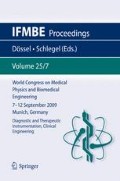Abstract
Introduction: In hemodialysis, a discrepancy between ultrafiltration rate (UFR) and plasma refill rate (PRR) often leads to a steep blood volume (BV) decline with ensuing intradialytic hypotension (IDH). Increasing the PRR could reduce IDH. Cold dialysate (CD) stabilizes blood pressure by increasing peripheral vascular resistance and inducing precapillary vasoconstriction. The latter lowers capillary hydrostatic pressure and could therefore also increase the PRR. Sodium profiling (SP) increases the osmolarity in the interstitial compartment. This prevents interstitial fluid volume loss to the intercellular compartment, thereby facilitating refill. Recently, we have developed a method to measure the absolute PRR. Using this method, the effect of CD and SP on refill was investigated.
Methods: Using a Gambro AK200 with BV sensor plus computer-guided external pump, initial UFR was set to 2x linear UFR to achieve a quick preset reduction of blood volume. A software feedback mechanism then continuously adjusted UFR to keep BV constant between very narrow preset boundaries. In this situation, the continuously changing, software-generated UFR quantitatively equalled refill. We measured the absolute PRR in 9 stable patients without IDH, undergoing hemodialysis without intervention, with CD (1°C below core temperature), and with SP (starting at 150 mmol/l, gradually declining to 140 mmol/l at the end of dialysis).
Results: Baseline PRR was 17.3 ± 5.1 ml/min (mean ± SD). Although CD did not significantly affect the PRR (19.7 ± 5.6 ml/min, NS), SP induced a significant improvement (22.6 ± 7.3 ml/min, p = 0.025 versus baseline). Adding CD to SP did not enhance the effect of SP on refill (n = 3).
Conclusion: Using our new method to measure the absolute plasma refill rate during hemodialysis, we demonstrated that sodium profiling indeed improves the plasma refill rate. A potential effect of cold dialysate on refill could not be established.
Access this chapter
Tax calculation will be finalised at checkout
Purchases are for personal use only
Preview
Unable to display preview. Download preview PDF.
Author information
Authors and Affiliations
Editor information
Editors and Affiliations
Rights and permissions
Copyright information
© 2009 Springer-Verlag Berlin Heidelberg
About this paper
Cite this paper
Brummelhuis, W.J., van Geest, R.J., van Schelven, L.J., Boer, W.H. (2009). Sodium profiling, but not cold dialysate, improves the absolute plasma refill rate during hemodialysis, measured by computer-guided, algorithm-controlled ultrafiltration. In: Dössel, O., Schlegel, W.C. (eds) World Congress on Medical Physics and Biomedical Engineering, September 7 - 12, 2009, Munich, Germany. IFMBE Proceedings, vol 25/7. Springer, Berlin, Heidelberg. https://doi.org/10.1007/978-3-642-03885-3_1
Download citation
DOI: https://doi.org/10.1007/978-3-642-03885-3_1
Publisher Name: Springer, Berlin, Heidelberg
Print ISBN: 978-3-642-03884-6
Online ISBN: 978-3-642-03885-3
eBook Packages: EngineeringEngineering (R0)

